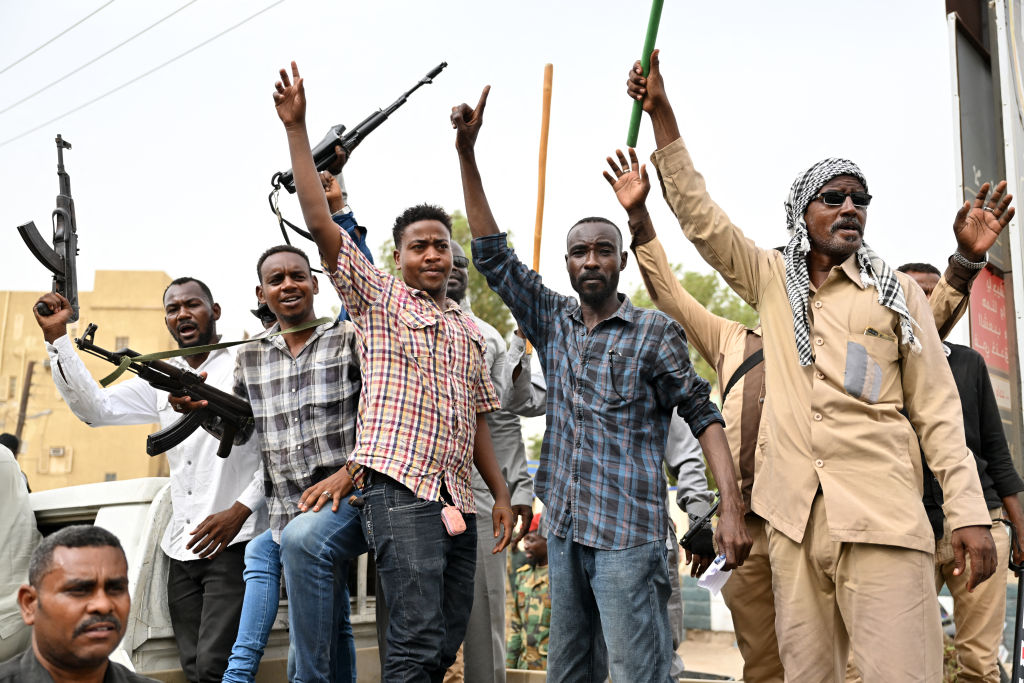ADF STAFF
Faced with the Rapid Support Forces’ relentless advance, the Sudanese Armed Forces has turned to poorly trained, lightly armed civilians to join the fight against its rival’s battle-hardened troops. It’s unclear, however, how effective that strategy has been.
Ahmed Mohamed joined several hundred people in a community self-defense group in al-Gezira state to take on the Rapid Support Forces, or RSF. The residents of Elmielg blocked the main road to the village, dug trenches and distributed light weapons to the community’s male residents.
“Unfortunately, we have been defeated after short battles,” Mohamed told Middle East Eye. “Some of the youth from the village have been injured and the RSF succeeded in entering the village. They whipped the men and took some of them away in their cars.”
Sudanese Armed Forces (SAF) Gen. Abdel Fattah al-Burhan, Sudan’s de facto leader, began urging civilians to join the fight against the RSF soon after the war with the Darfur-based paramilitary began in April 2023. In June 2023, the army opened military training camps across Sudan for volunteer fighters and began distributing weapons to civilians with the announced intention of taking them back after the war.
Since then, men and women of all ages have signed up to defend their communities. The SAF and RSF both have been criticized for recruiting young people and children into their ranks. As head of Sudan’s internationally recognized government, al-Burhan has been accused of following the same tactics used by former dictator Omar al-Bashir.
The SAF has fallen back on its historic relations with neighboring Eritrea for help with training civilian fighters. Eritrea has trained about 2,000 young people from eastern Sudan’s Hadendawa, Beni Amer and Rashaida tribal groups. Another 700 young people being trained in Eritrea were recruited from the eastern Gedaref state by the SAF-allied Sudan Liberation Army, run by militia leader Minni Minawi.
Since fighting broke out, RSF fighters have swept across southern Sudan from West Darfur to Sennar state in the southeast with little opposition from the SAF.
SAF soldiers and their militia allies have defended key locations such as el-Fasher, the besieged capital of North Darfur, where the army also has armed civilians.
Mohamed al-Faki Suleiman, a former member of Sudan’s Transitional Sovereign Council, has warned about the risks of arming civilians and sending them into battle against RSF fighters who have honed their skills as mercenaries in Yemen and Libya, among other places.
In December 2023, al-Burhan announced at army headquarters in al-Gezira state that nearly 40,000 people had joined military operations against the RSF. Soon afterward, the RSF took control of the state as the SAF withdrew.
Mohamed told Middle East Eye that after the RSF invaded el-Gezira state, civilians helped the military and militias turn back an assault on the community of Dabang. Despite victories such as Dabang, the SAF and its allies have not prevented the RSF’s continued advancement toward Port Sudan, where al-Burhan established his government after the RSF took control of Khartoum.
Critics of al-Burhan’s call for arming civilians say the strategy is likely to ignite tribalism and further polarize the country and increase the death toll in the nation’s civil war. That has not prevented people from joining al-Burhan’s recruitment effort.
Sawsan Osama is among a contingent of female recruits trained by the SAF in Omdurman.
“I joined this camp to learn to defend myself and my family,” Osama told al-Jazeera. Osama and her family were driven from their home in North Khartoum by RSF forces. They fled to Sennar state, only to be pushed into Gedaref state before joining recruits in Omdurman.
While women aren’t allowed on the battlefield, more than 10,000 have answered the SAF’s call for volunteers. Women said they were learning to use weapons to defend their children and families in place of the ineffective SAF.
“We want to take back what was taken from us,” Osama told al-Jazeera.

